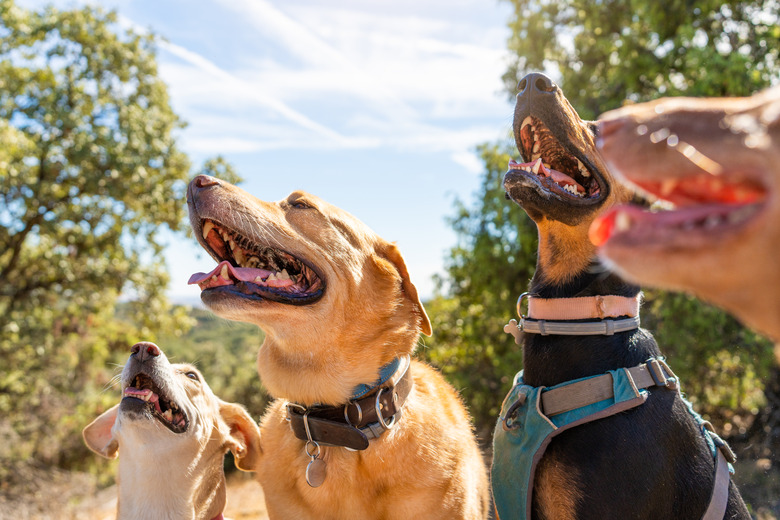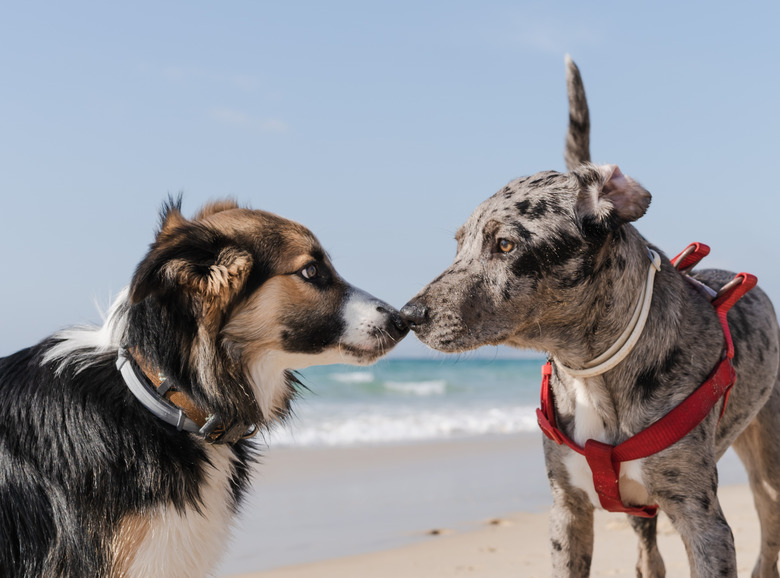Why Does My Dog Have A Droopy Face?
If you notice that your dog's face has become droopy, suspect a change to your pet's health involving weakness or paralysis of the facial nerve. Accompanying symptoms denoting problems with the facial nerve include an inability to blink, a drooping ear, messy eating, or drooling. While in many cases the underlying cause of a facial nerve impairment remains unknown, it's essential to seek veterinary assistance to rule out certain medical conditions.
Why is my dog's face droopy?
Why is my dog's face droopy?
Dysfunction of a dog's facial nerve can cause a dog's face to appear droopy. A dog's facial nerve, also known as cranial nerve VII, is responsible for controlling the muscles of the dog's face. This nerve branches into several localized nerves meant to serve the dog's ears, nose, eyelids, and lip muscles.
A lesion of the auriculopalpebral branch of the facial nerve affects the eyelids and ear. A lesion of the palpebral branch of the facial nerve affects the eyelids. A drooping mouth results from a lesion of the buccal branch of the facial nerve, affecting the dog's lips and nostrils.
Do some dogs have a naturally droopy facial expression?
Do some dogs have a naturally droopy facial expression?
Yes, many breeds of dogs and their crosses have naturally droopy faces. Some breeds known for their droopy facial expressions are:
- Neopolitan mastiff
- English bulldog
- Basset hound
- Bloodhound
- Boxer
- Dogue de Bordeaux
Possible causes of a droopy face in dogs
Possible causes of a droopy face in dogs
Having a dog with a droopy face can be very concerning for pet owners. Always seek veterinary attention if you notice that any part of your dog's face has started to droop, as it can be the symptom of an underlying medical condition that requires urgent treatment. Early diagnosis may prevent further damage, and often, full recovery is possible with treatment. Understanding possible causes of facial paralysis can help dog owners understand why it is crucial to seek veterinary advice.
History of trauma
A known cause of damage to the nerve controlling a dog's facial muscles is traumatic injury. Rough handling, a car accident, and a complication from surgery are examples of possible causes of traumatic injuries that could affect a dog's facial nerve. In a dog with a history of trauma, electromyography can help determine the extent of the damage; however, changes may not be noticeable until five to seven days following the injury. Treatment may include massage, heat therapy, electroacupuncture, and laser therapy.
Low thyroid function
Dogs are diagnosed with hypothyroidism when the thyroid glands in the neck produce low amounts of hormones. Hypothyroidism commonly affects medium to large middle-age dogs. Golden retrievers, Doberman pinschers, and cocker spaniels are particularly predisposed. It is estimated that facial nerve paralysis affects up to 70 percent of dogs showing clinical signs of hypothyroidism and nerve dysfunction. Along with a droopy face, affected dogs may exhibit the following symptoms:
- Hair loss
- A dull coat
- Excessive shedding
- Weight gain
- Reduced activity
- Sensitivity to cold
- Ear infections
- Skin infections
When a dog's droopy face is triggered by low thyroid levels, thyroid replacement therapy may resolve facial paralysis completely. It may take six to eight weeks before improvement is noticeable.
Middle ear infection
Infection of a dog's middle and inner ear is a common culprit for facial nerve problems. If left untreated, a middle ear infection may progress and involve a dog's facial nerve, which runs right next to the dog's ear canal. Dogs may develop visible drooping affecting one side of the face and mouth along with the inability to blink. If the condition progresses to an inner ear infection, the dog may also lose their ability to effectively balance themself and maintain equilibrium. Diagnosis can be obtained through an MRI or CT scan, and treatment involves a course of antibiotics.
If your dog shows symptoms of ear discomfort, see your veterinarian to prevent an outer ear infection from potentially progressing to the middle and inner ear. Facial nerve paralysis stemming from an ear infection can be permanent.
Idiopathic facial paralysis
The term "idiopathic" is a medical term often used to refer to a condition with an unknown cause. After ruling out infections, low thyroid levels, injury, or trauma, a veterinarian may diagnose a dog with a droopy face of without a known cause as having idiopathic facial nerve paralysis. Unexplained facial paralysis sometimes happens in people and is known as Bell's palsy.
Without a diagnosis, there can be no curative treatment. Nevertheless, your veterinarian will wish to offer palliative care for symptoms to prevent any discomfort or deterioration. For example, dogs who cannot blink may get dry eyes, and potentially a corneal ulcer on the affected side. In this case, artificial tears for lubrication would be prescribed.
Idiopathic facial paralysis can be either temporary or permanent. While a permanent droopy face may sound like bad news, facial nerve paralysis does not usually affect a dog's overall quality of life. Some dogs will experience improvement in their condition, leading to partial recovery.
The bottom line
The bottom line
Take your dog to the veterinarian immediately if any part of their face starts to appear droopy. The appearance of a droopy face in a dog who does not naturally have one is caused by a problem with the facial nerve. This can be a symptom of a serious illness. Facial drooping often improves with treatment, although in some cases, it can be permanent. If your veterinarian cannot find a cause for the drooping, they will treat any associated symptoms to ensure that your dog is comfortable.

